INDIGENOUS BUSINESS AUSTRALIA




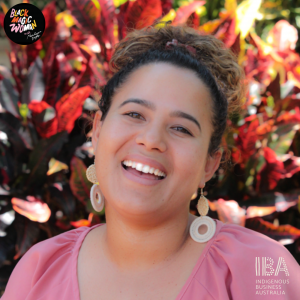
IBA are excited to announce that we’ve partnered with the Black Magic Woman Podcast to bring you a series of episodes that will be based on a variety of topics including housing, business, youth, women, investing, financial literacy, economic development and COVID-19 recovery.
In the first episode of the partnership series, Black Magic Woman's host Mundanara Bayles sits down to yarn with IBA customer Kantesha Takai.
Kantesha is from the Torres Strait and is the heart and soul behind Lola Digital; a boutique creative and content agency based on Thursday Island in the Torres Strait, that provides tailored marketing strategies and support to government, corporations, NGO's and small business.
Kantesha shares her experiences with IBA from buying her first home, to how IBA supported her through her business journey. We also yarn about her experiences and learnings from the IBA programs Kantesha participated in and how it inspired her to create economic development opportunities in her community. An amazing yarn to kick off the IBA and Black Magic Woman Podcast partnership series!
"I grew up on an island without any electricity or running water. To do my assignments at night, it was either get it done before the genny goes off or do it by using a torch. If I can do it, anybody can!"
- Kantesha Takai, Lola Digital
Listen to the episode here.
Over $10 million worth of upgrades to the Katherine Government Centre will deliver improved services, provide better access to clinics for the Katherine community, and create around 200 local jobs.
Katherine Government Centre is the hub for government services in the Big Rivers Region and the $10+ million refurbishment program will provide a new, more integrated service counter for the public, improved access to clinics, dedicated and separate entrances for clients to access more confidential and private services.
The centre is leased by the Northern Territory Government and the building owner is undertaking an extensive refurbishment and refit of the building from 1 March 2021 in return for a new 15-year lease.
The extensive works include a new service counter to be used by MVR, Housing and the Territory Business Centre, new facilities for Mental Health services, centralisation of Territory Families, Housing and Communities services, improved client engagement and office spaces for all eight agencies working in the centre and new conference and meeting facilities.
Katherine Government Centre forms part of the Indigenous Real Estate Investment Trust (I-REIT), a property investment fund whose investors comprise Indigenous Business Australia and 25 Indigenous investor groups.
Following a competitive tender, IBA Asset Management selected local Aboriginal construction company, On Country Construction, to undertake the estimated $10+ million refurbishment program.
Works start in March 2021 and are scheduled to be completed mid-2022. Works will be undertaken in stages to help minimise any disruption to services and inconvenience to the public.
During the refurbishment, Katherine MVR is temporarily relocating to 14 Katherine Terrace for approximately six months, and some health facilities will operate from Gorge Health Clinic on Second Street for around 12 months.
During construction, Community Corrections will relocate to the Randazzo Centre on Katherine Terrace, and the Territory Business Centre, NT Work Safe, Licencing, Director of Public Prosecutions and Police Prosecutions, currently in the Randazzo Centre, will relocate to the Katherine Government Centre.
All other services will continue to be delivered from the Katherine Government Centre during refurbishment but may be temporarily located in a different part of the building.
Signage will be provided to help guide and direct the public during the refurbishment program to minimise disruption and inconvenience.
The Minister for Corporate and Digital Development, Paul Kirby, said “Delivering quality government services to Katherine residents is our priority and these significant building upgrades will enhance our ability to better service the public.
“Katherine Government Centre is the hub for Katherine residents when dealing with government and these refurbishments will not only enhance the amenities for staff but improve service delivery and accessibility to medical clinics for residents.
“The refurbishment program will provide a contemporary workplace, significantly improving the way agencies operate and deliver services.
“The works will be staged to minimise any inconvenience to Katherine residents or disruption to service delivery.
“It’s great to see such a strong commitment and significant private investment into the town from Aboriginal investors into Indigenous owned and run businesses.”
Sean Armistead, Executive Director, Government & Public Relations, IBA, said, “IBA promotes self-management and economic independence through our investment work. Which means we want the best for Aboriginal and Torres Strait Islander organisations and businesses getting involved in commercial enterprises and investment opportunities.
“Whenever we can work with Indigenous businesses to deliver a project on a scale like this refurbishment, it’s a win for everyone – the local community, businesses, and stakeholders in the tenancy that will enjoy the update.
“The $10+ million refurbishment program will be completed using local trades, contractors and suppliers. On Country Construction is a joint venture between Ironbark Aboriginal Corporation and local construction company Jaytex Constructions.
“The upgraded facilities will lock in a lease agreement with the Northern Territory Government for 15 years which gives returns to the I-REIT and all its co-investors.”
Contact:
Tara Toohill, IBA, 0427 011 938
Lisa Sennett, NT Government, 0476 831 259
In partnership with Dr Kevin Dolman (Eastern Arrernte) and Professor Sheree Cairney from the Interplay Project, IBA undertook an inaugural impact research project throughout 2020. The findings are now being released.
Over 1,200 customers participated in this ground-breaking research which is already playing a significant role in helping IBA understand how the social, economic and cultural well-being of Aboriginal and Torres Strait Islander people is impacted by IBA’s products and services.
The research assesses short, medium- and long-term impacts and aligns with the United Nations Declaration on the Rights of Indigenous Peoples and the Sustainable Development Goals to progress Australia’s commitment towards economic empowerment of Indigenous people.
Led by an Indigenous evaluation expert, Dr Dolman, the Impact Report presents eight months of research, survey responses from over 1,200 customers and 15 hours of in-depth interviews. Partnering with the Interplay Project enhanced IBA’s ability to assess the evidence and data in a way that could assist in driving systemic change towards greater equity with customers.
Across all IBA divisions (Home Ownership, Business Solutions and Investment & Asset Management), the report concludes that IBA is generating positive impacts in relation to empowerment, financial resilience and wellbeing.
While the report found that customers experience positive impacts from the very beginning of their relationship with IBA, it was concluded that the further you are in your customer journey with IBA, the stronger the economic empowerment will be.
Overwhelmingly this report concludes there is a strong correlation between IBA Support (support, care and strong relationships) and positive impacts for customers. When customers feel understood and supported by IBA staff, they experience significantly increased levels of empowerment, resilience and wellbeing.
The external evaluators have made 15 recommendations to IBA in areas that will directly correlate to stronger results demonstrating positive improvements in the customer’s social, economic and cultural wellbeing. IBA is committed to implementing actions against each of these recommendations throughout 2021.
IBA Executive Director, Government & Public Relations, Sean Armistead, explains the Impact Framework and report were years in the making and was the first step in a long journey towards ensuring that products and services delivered by IBA are creating a positive impact across a customer’s life.
“We are attempting to flip the norm of reporting that has traditionally focused on outputs rather than impact.”
“The survey was about our customers, not the numbers. It represents everything they’ve told us.”
“IBA has been on a journey to understand the economic, cultural and social impacts our customers experience as a result of engaging with our products and services. This report is the culmination of that work that started with the Board approving the development of an Impact Framework in 2018.
“This report is only possible because of the generosity of over 1,200 of our customers and we are deeply grateful for their valuable contributions.”
“Providing 20,000 home loans to Aboriginal and Torres Strait Islander people over the life of our program is one thing but knowing they feel more financially accepted or have created intergenerational wealth for their families is our ultimate goal.”
“The correlation between support and positive impacts is clear. Our findings only accentuated what we already knew but it also emphasised we were working in the right direction. We want to expand this awareness and incorporate it into everything we do.”
Dr Kevin Dolman was the lead evaluator on the project, which included managing the research collaboration and ensuring compliance with cultural and evaluation ethics, as well as guiding the survey design, data analysis and reporting.
“By maintaining and increasing a strong focus on customer relationships, IBA will generate even greater positive impacts towards its statutory purpose of self-management and self-sufficiency for Aboriginal and Torres Strait Islander people.”
The Hon Ken Wyatt, Minister for Indigenous Australians, supports the research and its findings.
“This in-depth study demonstrates the impacts that can be made with investment in Indigenous people. Economic empowerment is crucial in efforts to reduce disadvantage, and this work shows the opportunities that are present to drive this progress.”
IBA will continue to track impact on an annual basis for years to come. The report was launched at an online event on 8 February 2021 with Minister Wyatt, Dr Dolman, Prof Cairney, and IBA Board Director Rosemary Addis.
Interviews available on request. A video recording of the launch event will be available soon. Link to the IBA Impact Report.
Media contact: Tara Toohill 0427 011 938 or tara.toohill@iba.gov.au
Have you ever considered building your own home? With IBA’s recent $150 million Government equity injection, building your own home could be a reality.
For Bunyah man Beau and his wife Jess, building their first home was a dream come true. The couple was attracted to building for the freedom of creating a home that was perfectly suited to them.
“Jess and I decided to build our own home because we really wanted to make the house ours. We wanted to start from scratch and just decide how we wanted to set the foundations for our family in a way so it would be perfect for us,” says Beau.
In the Federal Government’s bid to boost construction and employment opportunities, IBA received a $150 million equity injection. The funds will help Aboriginal and Torres Strait Islander people to get into the housing market sooner, with fast-tracked home loan applications for customers who are wanting to build a home in a regional location and the loans have no application fees and low deposit requirement.
“Building your own, you can tell people ‘I built this, I designed this, we chose this, and this is how we wanted it, and this is our ideas come to life.’ This is our dreams on a slab of concrete. This is what we wanted. So, the house can grow with us when we grow our family.”
If you’ve ever considered building, now may be the perfect time.
To find out more about the application process, contact one of our friendly home loan consultants.
More information on the equity injection.
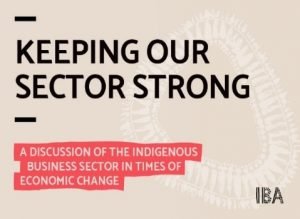
‘Invigorate – Build – Maintain’: words that resonate with many of us at these times, and thus a particular poignant theme for 2020’s Indigenous Business Month. As we wrapped up the month’s focus, we carry on the theme as generations of Aboriginal and Torres Strait Islander people have for thousands of years.
On 12 October IBA held a virtual business forum with the Minister for Indigenous Australians, the Hon Ken Wyatt AM, and inspiring business owners/leaders, Nicole Stewart and Katrina Fanning, to discuss how they have dealt with the current world.
The 2020 theme resonated with Nicole Stewart of Gerrbik Laundry Services. She noted, ‘Those three words mean EVERYTHING to me.’ As a business owner, she emphasised how she first had to invigorate herself after the huge impact that COVID had on her business. Then she could focus on building back.
Eighty per cent of Gerrbik’s business was with the airlines. Nicole had to diversify her business and manage as an entity based in Melbourne’s extended lockdown. Now she’s looking at new ways to service her customers and expand her base.
‘I had to invigorate me…So that I could maintain what business I did have and going forward what I need to build…It was hard and it’s going to be hard,’ said Nicole. ‘There’s a lot people out there that are scared to come back and process their life like they used to pre-COVID.’
Although the pandemic hit hard around the world, the resilience of Aboriginal and Torres Strait Islander people is unprecedented. Words like ‘unprecedented’, while true, don’t help to invigorate your next steps so the forum’s discussion ventured further into how to manage past the crisis.
The panel was moderated by IBA CEO Rajiv Viswanathan. He noted the discussion comes at a really important time for the Australian economy as a whole but also particularly for the Indigenous business sector.
‘We’ve seen the sector really grow and thrive and we’ve seen business owners across the country demonstrate incredible resilience and ingenuity,’ said Rajiv as the discussion ranged from recognition of the difficulties of 2020 to the positive outlook of the future.
Change is imminent but how we manage that change is key. The panellists gave insight to the diversity of businesses out there and their ability to adapt with the times.
The Minister emphasised that resilience and highlighted a roadmap for the future which must include economic development, employment and education. He noted that we need to look at all the elements to see where the hooks are for Indigenous people to gain the skills to grow opportunities.
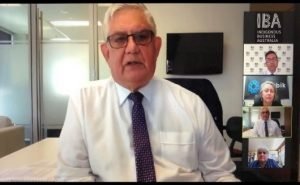
‘When Australia opens up again, it’s going to be a different world,’ said the Minister. ‘So, one of the things we need to look at is where are the opportunities that are different than what we intended in the beginning?’
The Minister noted the challenge will be how do we sustain not only the Indigenous businesses that exist now but grow more. He wants to see Indigenous people directly profiting from Indigenous held land – not handing that over for someone else to run and profit. He noted prospects for global relationships as well as emissions trading schemes and carbon footprint opportunities.
‘We’ve got to seize opportunities, support people on country, and provide the knowledge and skills they will require, plus resources in some instances.’
‘Certainly, IBA will play a critical role in the way in which we partner collectively to build capability among our people,’ said the Minister.
Nicole was upfront about running her own business. She noted that when you have a business, you might not have a huge amount of money in the bank. When she found out about IBA’s Business Relief Package, it changed her mind set for her business going forward.
‘My connection with IBA has been a lifeline to me!’ said Nicole. ‘They believed in me which has given me a lot more belief in myself.’
Nicole received a loan/grant package as part of the relief package announced in April 2020. The package was a collaboration with NIAA to provide Indigenous businesses that were impacted by the pandemic (whether an IBA customer or not) with support.
‘That’s where then I could invigorate ME once I was accepted for the loan,’ said Nicole.
Katrina Fanning is the Founder and Director of Coolamon Advisors, an Indigenous partner delivering the Business Relief Package with IBA.
Having met with multiple businesses through the process, Katrina was impressed by how hard they are working and how responsive they’ve been to the support. She said, ‘The diversity of the businesses that we have around the country really surprised me…They are just getting on with whatever it takes to get things moving.’
Katrina is a business owner herself so learned firsthand about the hits of the pandemic. Overnight she lost 3 months of bookings. She talked about how she had to reach out and leverage on her partnerships, as well as have the patience to rethink her service offering.
‘I had to change really quickly and be prepared to look at areas we hadn’t traditional worked in,’ said Katrina. She added, ‘Stay focussed on what’s your core business. Not to spread yourself really thin across a number of ideas as you won’t be able to put all your timing into it.’
Coolamon Advisors were among the many businesses that transitioned to online versus face to face to deliver business assessments with customers for IBA over video or phone.
Our Indigenous youth and women are two groups heavily hit by COVID – both the Minister and Katrina commented about these sectors and harnessing the strength they hold.
The Minister talked about cadetships and internships to leverage the skills of our youth and get them employed and into pathways for real jobs. He also noted the importance of education in the process. Katrina has seen small businesses, particularly family businesses, hit by the pandemic bring young people into the company and find a new invigoration in innovating the way to work.
Futures Forum is an initiative of IBA that is helping to rewrite the future of business that includes culture. Rajiv talked about the initiative and importance young people have as our future leaders.
Katrina and Nicole are part of IBA’s Strong Women Strong Business network and emphasised how Aboriginal and Torres Strait Islander female business owners are not alone in this.
‘We have got incredible resilience where we’re perfect for growing businesses,’ said Nicole. ‘We just got to believe in ourselves.’
She acknowledges it’s not going to be easy, but the rewards outweigh the work.
‘To lay in bed in the night-time and know that you’ve given it your all to get to where you are. Fight the struggles that you might find along the way,’ said Nicole. ‘Chase your dream. Because we can make it happen. IBA will help you, we’ll all help you.’
Minister Wyatt – ‘I eventually want to see that when we give a contract for a grade separation on a major road that it’s a 100% Aboriginal owned business that wins that contract…On the pathway to having an Indigenous company in the top ASX listing which means that you stand with the top 100-200 companies in this country…We have to dream that way.’
Nicole Stewart (Gerrbik Laundry Services) – ‘Our sector is going to be huge! We’ve faced diversity for many years and won…. But I honestly feel that our sector will go through the roof.’
Katrina Fanning (Coolamon Advisors) – ‘The one I’m most hopeful for is to see a growth in the size and length of the contracts that our businesses start to see, whether it be from government or corporate…I’m looking for those tipping points to open the gates even more.’
Rajiv Viswanathan (IBA) – ‘It’s been a really challenging year but it’s also a year and a time to reimagine what’s possible. And I think you’ve seen from our panel that there’s a lot of passion and inspiration out there that we can really capture as we come out of this phase and come into the recovery process. All of us together want to see this sector continue to thrive.’
View full video recording below:
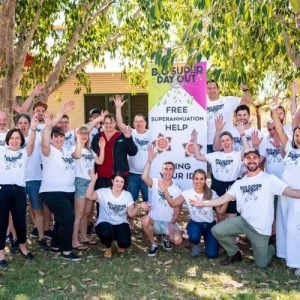
Indigenous Business Australia (IBA) partners with First Nations Foundation to deliver on their joint objective for the financial prosperity of Aboriginal and Torres Strait Islander people.
First Nations Foundation is a not-for-profit group established in 2006 with a majority Indigenous board. Their key areas of activity include financial education, superannuation outreach, and research into the financial position of Indigenous Australians.
IBA will work in partnership with the foundation to improve retirement outcomes and educate Aboriginal and Torres Strait Islander communities to navigate the superannuation system and improve their financial well-being, combatting the lowest rates of financial literary in the nation (HILDA 2018).
IBA will support two of the foundation’s major activities over the next two financial years – an Indigenous financial well-being website (to be launched this year) and their keystone event, Big Super Day Out, a superannuation outreach program for Indigenous communities.
IBA CEO Rajiv Viswanathan noted that a portion of the annual returns from IBA’s investment in the Indigenous Real Estate Investment Trust (I-REIT) are able to be used to promote Indigenous economic impact and the foundation’s work with financial literacy aligns with that intent.
‘Providing access to education and insight to the superannuation system can create long term effects for Aboriginal and Torres Strait Islander people that may not otherwise know how to navigate the benefits they are entitled.
‘The Big Super Day Out has a track record of reuniting Indigenous people with a significant amount of lost and unclaimed super – $24 million for more than 1600 people.
‘With an Indigenous majority board since 2006, First Nations Foundation has a remit to build financial education and IBA is proud to support the work they do.’
Media contact: Tara Toohill, 0427 011 938 or tara.toohill@iba.gov.au

Indigenous Business Australia (IBA) will receive $150 million in funding from the Federal Government over 2 years to stimulate construction and employment opportunities in regional locations. This equity injection will provide funding to support more Aboriginal and Torres Strait Islander people obtain a home loan to build their own home.
The additional funding will be committed over the next 2 years as part of IBA’s Indigenous Home Ownership Program and will enable people to access home ownership sooner.
IBA’s home ownership program is one of the longest standing programs successfully supporting economic self-management and self-sufficiency for Aboriginal and Torres Strait Islander people.
Over the life of the program, close to 20,000 Aboriginal and Torres Strait Islander people have been able to achieve their goal of owning a home, often becoming the first person in their family history to do so. In the past five years alone, IBA has provided more than $1 billion in home loans to a record number of applicants.
IBA CEO, Rajiv Viswanathan, noted that the organisation is constantly looking for ways to innovate, and expand funding wherever possible.
‘Demand for IBA’s home loan offering continues to grow at unprecedented rates, and we are committed to investigating as many ways as possible to grow available funds to assist more people to get into home ownership, building on the tremendous success of the Indigenous Home Ownership Program.
‘Home ownership is a key pillar on the journey to economic independence, providing not only stable housing, but also an anchor from which to build an asset base for current and future generations, and equity for other investment and business opportunities.
‘The ability for Aboriginal and Torres Strait Islander individuals and families to construct their own home will not only fulfil their dreams of home ownership but stimulate the economy at a time when we need it most.’
Jemma and Alan moved into their newly built home in January 2020. They know firsthand what it has meant to be build their dream as a homeowner. Alan, a Whadjuk Noongar man, said it was the worth the wait to get into a home that was new and all their own.
‘We wanted this for so long. It’s just so good. We can relax now,’ said Alan. ‘What we’re paying in mortgage now is what we were paying for rent so instead of paying someone else’s mortgage, we’re paying our own.
‘Budgeting is a major thing and doing your research. Find out the information before you say you can’t do it. Go talk to IBA and find out.
‘We enjoyed coming each weekend through the build and seeing each stage.’
Alan and Jemma used COVID isolation as a time to fix up their garden and things around the house. ‘This is ours. It’s perfect – it’s exactly how we wanted it.’
Minister for Indigenous Australians Ken Wyatt AM MP met with the homeowners at their new place to discuss what constructing their own home meant to them.
‘We discussed the benefits of owning your own home, including long-term wealth creation, financial security and independence,’ said the Minister.
The equity injection forms part of Australia’s overall economic stimulus package to get all Australians back on their feet and ensure Aboriginal and Torres Strait Islander people are an integral part of that recovery.
IBA Chairperson and Dagoman man Eddie Fry emphasised the importance of this opportunity for both the Australian economy and the Indigenous community.
‘We know that secure and stable housing plays a huge role in being able to build a happy and prosperous life, but it is much more than that – there are also substantial economic benefits to all of Australia.’
Interviews and pictures available upon request.
Media contact: Tara Toohill: 0427 011 938 or tara.toohill@iba.gov.au
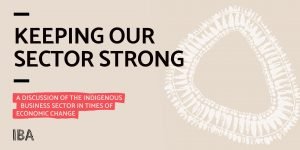 October is Indigenous Business Month and IBA will host a virtual forum to discuss how businesses are coping during these times.
October is Indigenous Business Month and IBA will host a virtual forum to discuss how businesses are coping during these times.
Our CEO Rajiv Viswanathan will moderate a panel discussion with:
Join us for the forum, ‘Keeping Our Sector Strong – A discussion of the Indigenous business sector in times of economic change’ on Monday 12 Oct from noon to 1pm AEDT.
Places are limited so please register to attend. Once registered, a link to access the forum will be sent ahead of the session.

IBA’s Performance Bond Trust has assisted contractors across the country to participate in a wide variety of contracts including mining, civil works, construction, facility upgrades and renewable energy construction by guaranteeing their capacity to complete projects while requiring minimal security.
One of those contractors was Hicks Civil & Mining Pty Ltd - a 100% owned Aboriginal business providing civil construction services and equipment hire throughout the Pilbara region in WA. Through the IBA Performance Bond Trust, they were able to successfully tender to the Koodaideri iron ore mine and have delivered earthwork and drainage works for the project to date.
Hicks Civil and Mining Director, Caitlin Hicks Forshaw says, “We are now focusing on finishing off this project strong and leaving a reputation that will be put down in the history books for Aboriginal Contractors and be the example of showing that Aboriginal Contractors have the capacity to deliver such projects.”
“While we have both our onsite and offsite management teams – it’s the people and organisations that surround us that have also assisted in this project. IBA have been a massive contribution to our business and I have to thank them immensely.”
Through their hard work and success, Hicks Civil & Mining have been able to give back to their community supporting initiatives such as funding school pick-ups and sponsoring local events.
Since inception in 2018 the IBA Performance Bond Trust has now supported over 170 bonds worth $12 million, supporting contracts valued at nearly $202 million. Bonds totaling $167,600 have been returned due to successful completion of projects, many of which have been in regional and remote locations.
Find out more about our Performance Bonds.

Territory
Indigenous Business Australia (IBA) provided the funding to construct two state-of-the-art commercial satellite ground stations in Alice Springs. The facility is the first development of its kind on Aboriginal owned land and transforms Australia’s capability in earth observation.
Built, project-managed and owned by Indigenous companies – the Centre for Appropriate Technology (CfAT) and its subsidiaries Ekistica Ltd and CfAT Satellite Enterprises, as well as Ingerreke Commercial who laid the concrete foundations in December. The facility forms part of a global network of ground stations operated by Viasat Inc called Real Time Earth.
This new infrastructure has the potential to reduce the latency for high resolution earth observation imagery down from hours or days, to just minutes. The result will be to enhance Australia’s capability in disaster management (such as cyclones and bushfires), environmental monitoring, border protection and search and rescue, as well as strategic uses such as monitoring the economic impacts of pandemics like COVID-19 from space.
CfAT CEO Peter Renehan said, ‘This facility brings together our mission of engagement and people, innovation and excellence – and puts Aboriginal people at the forefront of Australia’s growing space sector.
‘While many have been locked down from COVID-19, our build has been full speed ahead with an Aboriginal-owned project management team and support crew that assembled the antennas.
‘There is currently limited supply of suitable earth observation ground stations in Australia. Here in Alice Springs we are strategically located to take advantage of this fast-growing market. The site is so perfectly located that we will be able to downlink imagery across the whole of Australia’s land and waters.
‘We are very excited about the future of this technology which we know has the potential to benefit many of our communities, like our Indigenous rangers who look after land and sea country and can use high resolution imagery from space to do their jobs.
‘CfAT have also been awarded the facilities maintenance contract by Viasat, which will generate on-going Indigenous employment and training opportunities for our community.’
IBA Chairperson Eddie Fry emphasised the importance of this opportunity for both the Australian space industry and the Indigenous community.
‘Aboriginal and Torres Strait Islander people own or control significant areas of land in remote areas where there is limited economic potential. This first of its kind development on Aboriginal land gives the community both economic and social returns.
‘The technology has many commercial applications, such as for remote asset management, agriculture, carbon abatement, insurance, finance, and mining.
‘Strongly aligned with the priorities for the Australian Space Agency, this investment puts CfAT on the map as a commercial technology innovation hub.
‘This is just the beginning and we can see a bright future for CfAT who are well-positioned to become one of Australia’s leading participants in the satellite and space industry.
‘Not only will this facility generate commercial returns for Indigenous Australians, it will create wider industry opportunities for the Northern Territory. CfAT will invest in training Aboriginal people in maintaining the facility and build its capacity for bringing innovative technology-based programs to Aboriginal people in the region.’
Minister for Indigenous Australians Ken Wyatt AM MP said the launch of this project demonstrates how Aboriginal and Torres Strait Islander people could continue leading roles in our nation’s innovation, as they have done for more than 60,000 years.
‘Indigenous Australians hold a powerful economic force through their connections with land, culture and community,” Minister Wyatt said.
‘This exciting project is a prime example of the power of country to help deliver commercial returns through technology, employment and career opportunities.’
Interviews and pictures available upon request.
Media contact: Tara Toohill 0427 011 938 or tara.toohill@iba.gov.au
About IBA
IBA is a commercially focused organisation. Economic independence for Aboriginal and Torres Strait Islander peoples is at the heart of what we do. Our programs assist Indigenous Australians to buy their own homes, be successful in business, and invest in commercial ventures that provide strong financial returns. IBA is established under the Aboriginal and Torres Strait Islander Act 2005 (ATSI Act) and is a corporate Commonwealth entity for the purposes of the Public Governance, Performance and Accountability Act 2013 (PGPA Act). IBA resides in the portfolio of the Prime Minister and Cabinet, and is accountable to the Australian Parliament through the Minister for Indigenous Australians, the Hon Ken Wyatt AM MP.
About CfAT Ltd
CfAT is an Aboriginal company, with 50% Aboriginal workforce, established in the 1980’s, that operates across regional and remote Australia delivering infrastructure and technology solutions mostly to Aboriginal and Torres Strait Islander communities, providing service and infrastructure platforms that allow people to maintain their relationship with country. The company’s approach is driven by the view that the successful delivery of services and the technologies and infrastructure used to achieve them will be different to the way things are done in urban Australia. This has shaped our success and led to the development of highly innovative new technologies.
About Viasat
Viasat is a global communications company that believes everyone and everything in the world can be connected. For more than 30 years, Viasat has helped shape how consumers, businesses, governments and militaries around the world communicate. Today, the Company is developing the ultimate global communications network to power high-quality, secure, affordable, fast connections to impact people's lives anywhere they are—on the ground, in the air or at sea.